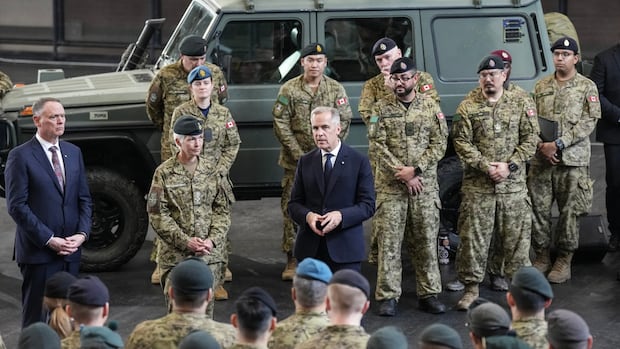Prime Minister Mark Carney plans on joining a sweeping European plan in Belgium this month to rearm the continent and provide more military aid to Ukraine, CBC News has learned.
Last month, Carney signalled to CBC’s Power & Politics that he hopes to sign on to the new defence initiative by Canada Day as he tries to move away from relying on the United States for weapons and munitions.
Now sources with knowledge of the matter say Carney is expected to join the rearmament deal as early as June 23, when he meets with European leaders in Brussels at the EU-Canada summit.
Carney hinted on Monday this summit will “be more important than ever.”
“Canada will arrive at this summit with a plan to lead, with new investments to build our strength in service of our values,” Carney said.
With the Western Alliance eroding under U.S. President Donald Trump, could Canada’s defence support shift to Europe? As CBC’s Evan Dyer explains, the country’s understrength military doesn’t offer much in the way of troops presence, but it does have other things Europe needs.
The prime minister has said he’s been in talks with European countries for months about closer defence co-operation. Carney wants to build up Canada’s defence capabilities and expand its military suppliers beyond the U.S. as President Donald Trump wages a trade war on Canada and most of the world.
“Over 75 cents on every dollar of capital spending for defence goes to the United States. That’s not smart,” Carney told Power & Politics host David Cochrane on May 27.
Carney said it would be better to “spend more at home” with “diversified partnerships.”
CBC News is not naming the sources because they were not authorized to speak publicly about the deal.
European Union President Ursula von der Leyen first proposed the plan called ReArm Europe in March to bolster the continent’s military capabilities during global threats, Russia’s ongoing invasion in Ukraine and uncertainty with the United States.
‘The first step is joining the club’
The plan, renamed Readiness 2030, includes boosting European defence spending by up to 800 billion euros, including a 150-billion euro loan program to pay for more military technology and weapons. It’s unclear how much money Canada would contribute.
CBC News asked the Prime Minister’s Office for details about the spending commitment and has yet to receive a response.
Carney announced more than $9 billion in new military spending this fiscal year on Monday — and said Canada must further increase defence spending in the years to come.

Once Canada joins the European deal, the government will have to decide what initiative it wants to launch and which countries it will partner with. The list of potential projects includes air and missile defence, drones and anti-drone systems, artificial intelligence and electronic warfare.
“The first step is joining the club. The next step is deciding what projects you want to work on with other club members,” said Dave Perry, president of the Canadian Global Affairs Institute.
Support for Ukraine
Ahead of the EU-Canada summit, Carney is also expected to announce more support for Ukraine.
As part of Carney’s promise to increase defence spending this year, supplementary estimates this week show the government has earmarked $2 billion for military aid to Ukraine and to expand defence partnerships.
A source told CBC News the government is expected to reveal how much of that money will go toward Ukraine at the G7 meeting in in Kananaskis, Alta., next week.
Carney is hosting this year’s summit and invited Ukrainian president Volodymyr Zelenskyy, who hopes to urge Trump to move forward with a stronger sanctions package on Russia.
Canada will hit NATO’s two per cent defence spending target this year, Prime Minister Mark Carney announced Monday, promising billions in military upgrades.
Three years into Russia’s full-scale invasion of Ukraine, it continues to push forward in the Donbas region where Ukrainians are progressively losing “more and more” territory, Perry said.
Ukraine needs armoured vehicles, artillery systems, ground-based air defence systems and munitions, he said.
“They need help repairing all of the critical infrastructure the Russians are going after,” he said. “They need the funding to basically keep the government of Ukraine solvent … they need a whole range of things.”


